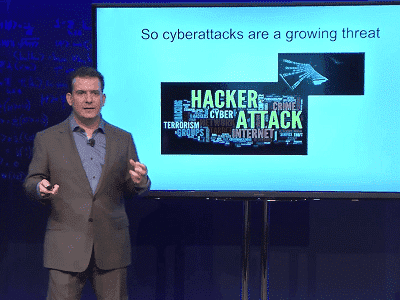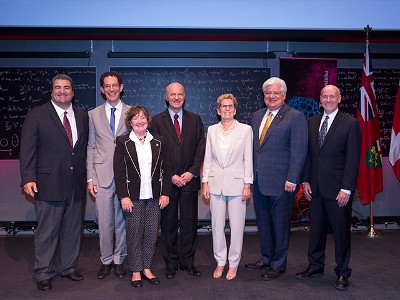Listen to an expert explain how quantum computing is going to change our lives

 The Perimeter Institute for Theoretical Physics in Waterloo, Ontario kicked off its public lecture series last night with a presentation called “As We Enter The New Quantum Era” by Michele Mosca, co-founder of the Institute for Quantum Computing, in which he attempts to explain the fields of quantum theory, physics and mechanics for an audience of laypeople.
The Perimeter Institute for Theoretical Physics in Waterloo, Ontario kicked off its public lecture series last night with a presentation called “As We Enter The New Quantum Era” by Michele Mosca, co-founder of the Institute for Quantum Computing, in which he attempts to explain the fields of quantum theory, physics and mechanics for an audience of laypeople.
Last April, our charming Prime Minister Justin Trudeau rather glibly summarized quantum science for an amused group of journalists in a way that suggested both that Trudeau himself has at least acquainted himself with the subject and that quantum science is vastly more complicated than any person’s capacity to express it in a 15-second sound bite.
Michele Mosca’s expertise is in cryptography and the ways that quantum computing is going to impact, both positively and potentially catastrophically, the system for transmitting information securely around our infrastructure, which is a lot more precariously constructed and Jerry-rigged than most people imagine.
For many years now Mosca, in his capacity as co-founder of the Institute for Quantum Computing and founding member of Perimeter Institute for Theoretical Physics, has been pushing companies and governments to prepare for a reality in which the public key cryptography that we currently use to transmit information around the world is easily foiled by hackers with access to quantum tools or techniques.
Mosca does his level best, in the course of a one-hour presentation, to explain to us what’s “going on under the hood” with respect to quantum theory.
As he makes clear, “We’re entering what some people call the Second Quantum Revolution,” in which we can now store and manipulate things with some very sophisticated quantum effects that aren’t naturally occurring.
“When you look at the implications of quantum theory on computation, you actually get a fundamentally new mode of computation,” he says. “Quantum information is yet another language with which to understand how information behaves in a quantum mechanical context.”
He begins by describing this new era as a completely different paradigm for physics, discovered roughly a century ago, that we’re just scratching the surface of when it comes to what the possible applications are in everyday life.
“A hundred years ago, we learned that there was a new game for physics,” he says. “We learned the rules of the game. But it took over a century to start really playing the game and controlling things in a very quantum mechanical way.”
This could be anything affecting communication, computation and cryptography, but also has vast potential application in other fields, from the design of new materials and drugs, the optimization of processes, as well as sensing and measuring technologies and computer security, not to mention a host of other applications that haven’t occurred to anyone yet.
For those of us who think that this stuff is a long way off, Mosca makes it clear that quantum technology is a matter of when, and not if, and that it’s in our own best long-term interest to start working now on developing tools to defend against what could become a big problem.
So, how different is quantum theory compared to classical ways of using computers and to life as we know it?
In Dr. Mosca’s analogy for how to think about the new paradigm, it will be like making the mental leap from thinking about the Earth as a flat disc-like object, which was the model we assumed was correct for many centuries, to understanding that the Earth is round.
“I really think we’re just scratching the surface, because we really don’t have the devices in our hands, at least not on a wide scale, for people to try things and figure out what the useful applications might be and how they might help us in our lives.” – Michele Mosca
Mosca’s main research preoccupation is on preparing our systems to be safe in an era of quantum computers, but his field has even bigger, more serious implications, both practical and philosophical.
As well as posing a threat to old ways of thinking about and doing things, quantum computing opens up a host of possibilities that is going to change.
“What are these quantum computers good for?” he asks. “What they’re good for is finding global patterns, global properties, or what I sometimes call seeing the forest without actually observing the trees.”
What explains people’s reluctance to grapple with quantum theory, other than the fact that you need an advanced math degree to understand it, is that it all seems a very long way off, and the computers that we have now seem “good enough”.
“I really think we’re just scratching the surface, because we really don’t have the devices in our hands, at least not on a wide scale, for people to try things and figure out what the useful applications might be and how they might help us in our lives,” he says.
“Just like in the ’40s, we certainly didn’t imagine applications of computers today, or in the ’80s and ’90s the applications of the internet today are far beyond most of our imagination,” he says. “Or wireless communication a century ago, who would have thought of what we’re using it for today?”
One massive problem ahead in the realm of quantum computing will be in cryptography, and it’s only this year that governments around the world have begun to develop standards for cryptography that might be tamper-proof against quantum techniques.
In classical computing, as Mosca points out, encoding information is easy, while decoding information is very difficult.
Quantum theory flips that situation, so that encoding becomes difficult and decoding becomes hard, meaning that our current forms of cryptography and encoding and guarding our secrets using passwords and whatnot will be almost instantly foiled by a hacker with a quantum computer.
“So that’s bad news,” says Mosca. “On the one hand, we want to seize all the wonderful opportunities that quantum technologies offer, but we don’t want our cyber-infrastructure to collapse.”
Access to quantum tools would give cyber-attackers a quick way to break any code or hack any system, wreaking havoc on a network that we’re basically now totally reliant on to live our day-to-day lives.
“I want to emphasize that quantum information science and technology is not just about building next-generation information and communication technologies,” says Mosca. “Obviously, that’s a big part of what’s motivating this endeavour. But it’s also a fundamental, profound and powerful lens through which to study fundamental physics. Both the science and the technology.”
It is worth sticking to the end of Mosca’s talk to witness him bursting the bubble of an audience member during the Q&A session who wants to know whether he or any of his colleagues are working to solve the problem of “quantum transportation” otherwise known as Star Trek-style teleportation.
The answer, disappointingly, is no.
Watch Michele Mosca’s presentation in the video below:

Terry Dawes
Writer


